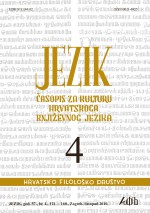
We kindly inform you that, as long as the subject affiliation of our 300.000+ articles is in progress, you might get unsufficient or no results on your third level or second level search. In this case, please broaden your search criteria.

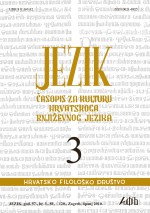
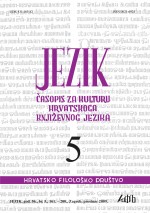
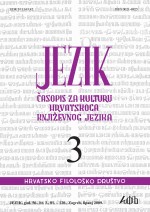
The paper analyzes the position of the Croatian language in communist Yugoslavia. It discusses the positive examples of preserving the peculiarities of the Croatian language despite the Serbian pressure, and the difficult unitarianist conditions in which the Croatian language had been at that time.
More...
The paper discusses the positive views of the well known Croatian communist party leader Vladimir Bakarić about the standard Croatian language and his relatively negative attitude towards the Yugoslav unitarianist language politics.
More...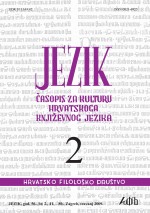
This paper provides an analysis of grammatical congruence occurring between an apposition and a noun the apposition is associated with. The analysis highlights deviations from the rules pertaining to congruence between the apposition and the noun, i.e. deviations caused by the noun (or a proper name) remaining in nominative case, regardless of the case the apposition associated with that noun (or that proper name) is in. The paper includes orthographic solutions related to such occurrences (namely, the writing of such appositions).
More...
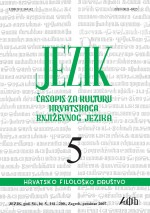
Review: Robert Lawrence Trask, Temeljni lingvistički pojmovi, Školska knjiga, 2005, s. 468 / Key Concepts in Language and Linguistics (Routledge, London i New York 1999). Reviewed by Mate Kapović.
More...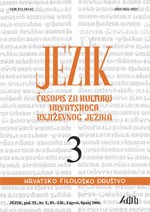
Conference Report (Sanda Ham): Scientific Conference on the Occasion of the Anniversaries of Stjepan Babić Conference Proceedings
More...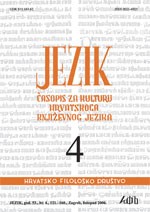
Book-Review: Stjepko Težak, Između jezika i stila, Tipex, Zagreb, 2005., str. 195 (Dunja Pavličević-Franić)
More...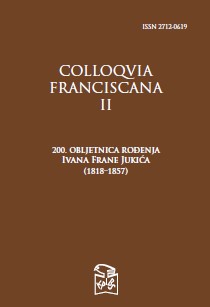
Considering the cultural significance of travel literature as a multipurpose genre and its privileged place in the comparative research studies of imagology the paper analyzes travel writings of two contemporaries – Ivan Frano Jukić (1818–1857) and Matija Mažuranić (1817–1881). Six Jukić’s travel writings (Putovanje iz Dubrovnika preko Hercegovine u Fojnicu /1841/, Putovanje po Bosni 1842., Povratak u Bosnu 1842., Putovanje po Bosni godine 1843., Putovanje po Bosni godine 1845., Putovanje iz Sarajeva u Carigrad /1852/) and Mažuranić’s Pogled u Bosnu ili Kratak put u onu Krajinu, učinjen 1839-40. po Jednom Domorodcu (1842) are the source of numerous geographical, ethnographic and historiographic data. This research is focused on reflections on confessional, ethnic and social identities of Ottoman Bosnia, with emphasis on the similarities and differences between native (Bosnian) and foreign (Croatian) travel writer in the perception and axiological attribution of particular confessional identities (Catholic, Orthodox, Muslim).
More...
This paper analyzes intertextual relations between the 18th century Franciscan chronicles and the selected works of Ivo Andrić and Josip Mlakić, taking into consideration the theoretical concepts of narration and evil. Based on the selected 18th century Franciscan chronicles, the paper examines the connection between narration as memory and history as „magistra vitae.“ Consequently, narration is established as a source of knowledge, but also as the guardian of threatened identity. Furthermore, the analysis shows the importance of the 18th century chronical tradition within the works of Ivo Andrić, including the short stories of the so called „franjevački ciklus“ (The Franciscan Cycle) and his novels Travnička hronika (Bosnian Chronicle), Na Drini ćuprija (The Bridge on the Drina) and Prokleta avlija (Damned Yard). The structural logic of these works is dependent on the repetition of historical evil inscribed in Bosnia, which is in turn written-out through the the figure of the Bosnian Franciscan. Franciscans, thus shaped by Andrić, reveal the shift from politics to poetics and ultimately become symbols of narration and memory. Moreover, this symbol is later employed in Josip Mlakić’s works, particularly in the novel Tragom zmijske košuljice (Tracing the Snakeskin). The paper further shows how Mlakić’s novels rely on the same repetition of evil, but otherwise differ in the way narration is understood. His novel Kad magle stanu (When the Mists Have Stopped) thematizes the failure of narrating uniform identity and reveals new narratives that provide the basis on which the subject can independently (de)construct itself. The analysis of the novel Evanđelje po Barabi (The Gospel According to Barabbas) then emphasizes the performativity of unreliable narration which takes part in constructing the idea of the world and of evil. Finally, the complex nature of story and its equivalence to life governed by inexpressible evil is examined in the context of Mlakić’s novel Skica u ledu (A Sketch in Ice).
More...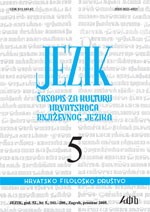
In the dispute over the beginnings of the standard Croatian language, the author calls for an analysis of the already published data and grounds for the assertion that the present-day standard Croatian language gas its beginnings in the late 15th century.
More...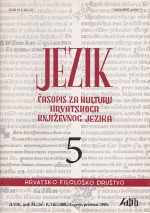
Review of International Scientific Conference on Milan Rešetar (Vlasta Rišner)
More...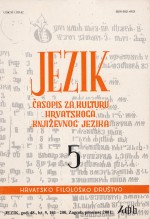
Zamoljena da pogledam prijevode Novoga i Staroga zavjeta u kojima se nalaze primjeri sa je iza pokrivenoga r nastali poslije 1921., evo što sam pronašla.
More...
Skupljajući primjere za je iza pokrivenoga r, zapazio sam da u mnogim kalendarima za blagdan 8. prosinca često piše Bezgrješno začeće.
More...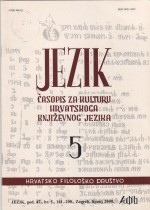
The author presents the book by Guberina and Krstić, The Differences Between the Croatian and Serbian Literary Languages, as a manual which has been of crucial importance in the development of the theoretical views of Croatian as a separate language and in the preservation of the Croatian lexis in the systematic attempts at serbization carried out by the Yugoslav regimes of 1918-1941 and 1945-1990.
More...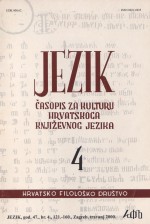
The paper deals with the origin of the book Razlike između hrvatskoga i srpskog književnog jezika, written by Petar Guberina and Kruno Krstić in 1940. That book was an answer to unitary language politics in Yugoslavia 1918-39, denying the existence of Croatian literary language.
More...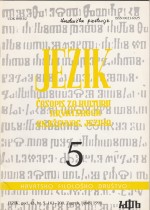
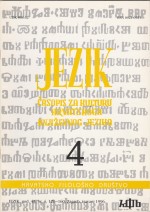
The author discusses the beginnings or the Croatian language instruction at the highest School in Croatia at the time, the Kraljevska akademija znanosti (Regia Scientiarum Academia), and the work of its first teacher of Croatian, Matija Smodek.
More...